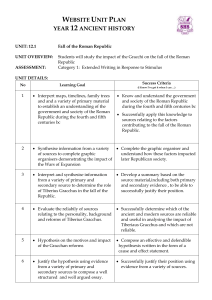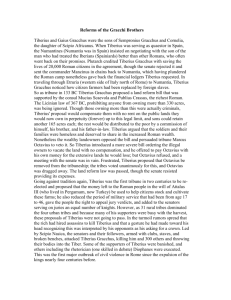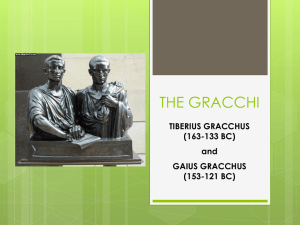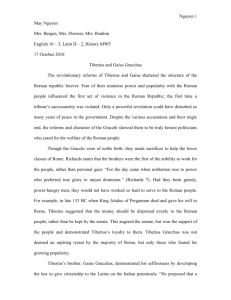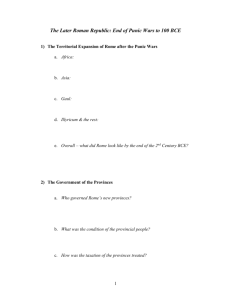14. Tiberius Gracchus.
advertisement
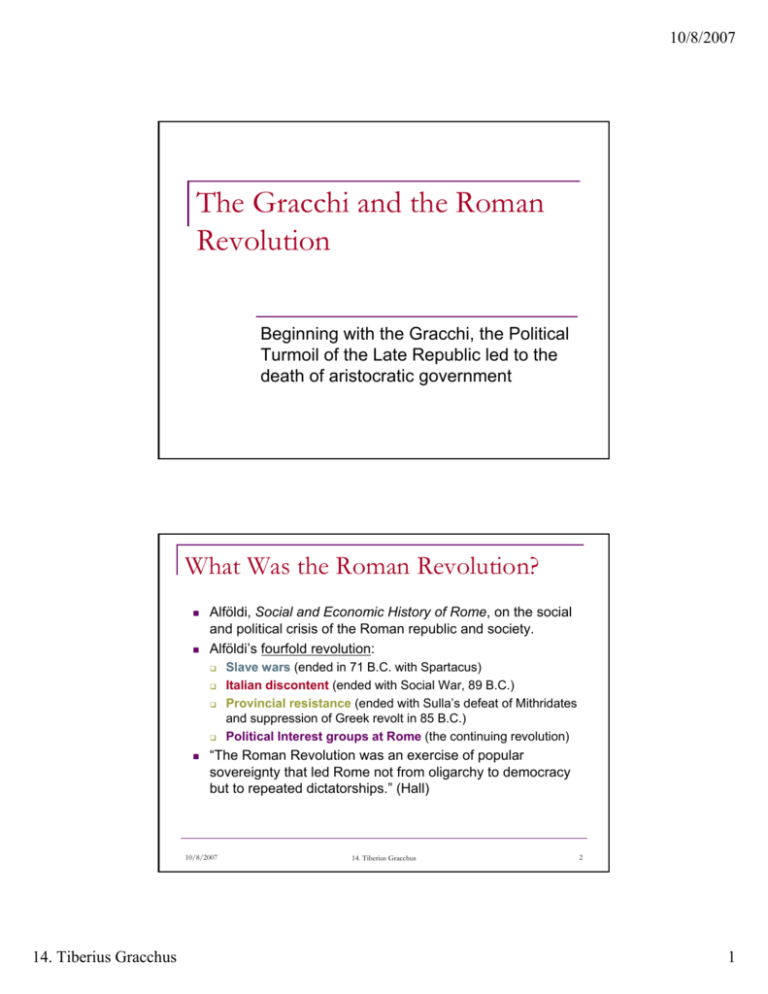
10/8/2007 The Gracchi and the Roman Revolution Beginning with the Gracchi, the Political Turmoil of the Late Republic led to the death of aristocratic government What Was the Roman Revolution? Alföldi, Social and Economic History of Rome, on the social and political crisis of the Roman republic and society. Alföldi’s fourfold revolution: “The Roman Revolution was an exercise of popular sovereignty that led Rome not from oligarchy to democracy but to repeated dictatorships.” (Hall) 10/8/2007 14. Tiberius Gracchus Slave wars (ended in 71 B.C. with Spartacus) Italian discontent (ended with Social War, 89 B.C.) Provincial resistance (ended with Sulla’s defeat of Mithridates and suppression of Greek revolt in 85 B.C.) Political Interest groups at Rome (the continuing revolution) 14. Tiberius Gracchus 2 1 10/8/2007 Results of Imperialism Crises of the Late Republic (Flor. Ep. 1.47.1-13 = packet, 13-14) Economic: flood of wealth from the empire into Italy Social Rich become richer, poor become poorer Establishment of latifundia and slave-based commercial agriculture Ruin of the small farmer Increase of the urban proletariat Decrease in the citizen soldier Repeated threats of slave revolts Political 10/8/2007 Division of wealthy into the politically empowered and the relatively disenfranchised Rise of demagogic politics and political violence 14. Tiberius Gracchus 3 Alföldi’s Political Tensions Fourfold political struggle Within the senatorial aristocracy Between senatorial class and the new equestrian order Equestrians: non-political wealthy, elites that did not pursue public careers and did not sit in the senate Between the upper classes and the proletariat Between the rich estate owners and the poor peasants and landless poor 10/8/2007 14. Tiberius Gracchus Between noble factions and their clients Senators pursued different political methodologies (e.g., working through the people or through the Senate), not necessarily different programs 14. Tiberius Gracchus 4 2 10/8/2007 Sources for the early revolution Appian, Civil Wars Plutarch Would that we had Livy! Lives of Tiberius and Gaius Gracchus Periochae are tantalizing Much of his discussion of Struggle of the Orders actually reflects issues of the Late Revolution Florus, Epitome of Roman History (or “Abridgment of All the Wars over 1200 Years”) 2nd century A.D., drawn largely from Livy See packet, 13-14 10/8/2007 14. Tiberius Gracchus 5 The Gracchi Tiberius and Gaius, two sons of Ti. Sempronius Gracchus, hero of the Spanish wars Part of the senatorial aristocracy The Gracchi were pivotal figures in Roman political history Senatorial opposition to their reforms was more political than economic Introduced both demagoguery and violence (on both sides) to Roman politics The “Roman Revolution” begins with Tiberius’ tribunate and murder Coopted by modern political “reformists” 10/8/2007 14. Tiberius Gracchus the elder Gracchus had ennobled the family through his consulship and then gained more auctoritas through his career Be careful of modern interpretations of their motivations 14. Tiberius Gracchus 6 3 10/8/2007 What drove Tiberius’ reforms? Greek political philosophy Sagging military recruitments Prevalence of latifundia Sicilian slave rising Senatorial abuses Example of Etruscan estates (see Plut. Vit. Ti. Gracch. 8.7– 9, 14.1–2 = LR I no. 97) Extortionate governors double dealing with Spanish settlements, etc. Power politics . . . 10/8/2007 14. Tiberius Gracchus 7 Reality of Factional Politics 14. Tiberius Gracchus Collapse of the Gracchan and Scipionic alliance after Numantia (see Table 2 [packet, 39]) The elder Gracchus had married a Cornelia, daughter of Africanus the elder Adoption of Scipio Aemilianus (the younger Africanus) took the Cornelii into the family faction of L. Aemilius Paullus Macedonicus New alliance of Aemilii, Fabii, and Cornelii cut Tiberius and Gaius out of the picture! 4 10/8/2007 Building a New Faction Marriages of Tiberius and Gracchus brought them into a potentially powerful new grouping included P. Mucius Scaevola, P. Licinius Crassus, and Ap. Claudius Pulcher Not enough initially to overcome senatorial opposition 10/8/2007 9 14. Tiberius Gracchus Cursus Honorum and the tribunate 180 B.C., lex Villia annalis regulated the cursus and one’s political career Position of the tribune of the plebs had been incorporated into the senatorial hierarchy Served interest of senatorial nobility Functioned as a stepping-stone for plebeian nobiles Tiberius and his faction decide to do something new with the tribunate . . . 10/8/2007 14. Tiberius Gracchus Set ages for positions: quaestor 25 (followed by tribunate if plebeian), aedile 36, praetor 39, consul 42 No continuous office holding—no iteration (traditionally ten years between consulships if repeated) 14. Tiberius Gracchus 10 5 10/8/2007 Goals of Tiberius Gracchus Gain revenge on political enemies (not necessarily the entire senate!) Restore family’s reputation and position His own name had been blackened by the senate’s refutation of his Numantine Treaty Gain political preeminence Challenging political program a tool to this end Build a large clientele for future support 10/8/2007 14. Tiberius Gracchus 11 Tiberius’ lex agraria Question of ager publicus Defeated Italian enemies routinely surrendered portion of territory to Roman state Leased out to wealthy Romans, who treated it as personal property Land package moderate (see Appian, BC 1.1.8 = Mellor2, 69–70) Limit of 500 iugera per family Additionnal 250 iugera per son Recovered ager publicus to be distributed to landless poor 10/8/2007 14. Tiberius Gracchus vast amounts confiscated after defeat of rebellious allies in II Punic War Reduce dependence upon slave labor Restore citizen farmer class, increase military recruitment Produce a new clientele for Tiberius! 14. Tiberius Gracchus 12 6 10/8/2007 Land Commission Tiberius’ plebiscitum established a three man board for division of land Tiberius Gracchus, father-in-law Ap. Claudius Pulcher, Gaius Gracchus Senate refused to fund commission Usurpation of Pergamum bequest infringed upon senatorial monopoly of foreign affairs (see Appian, BC 1.1.9-1.2.16 = packet, 15) 10/8/2007 14. Tiberius Gracchus 14. Tiberius Gracchus 13 7

